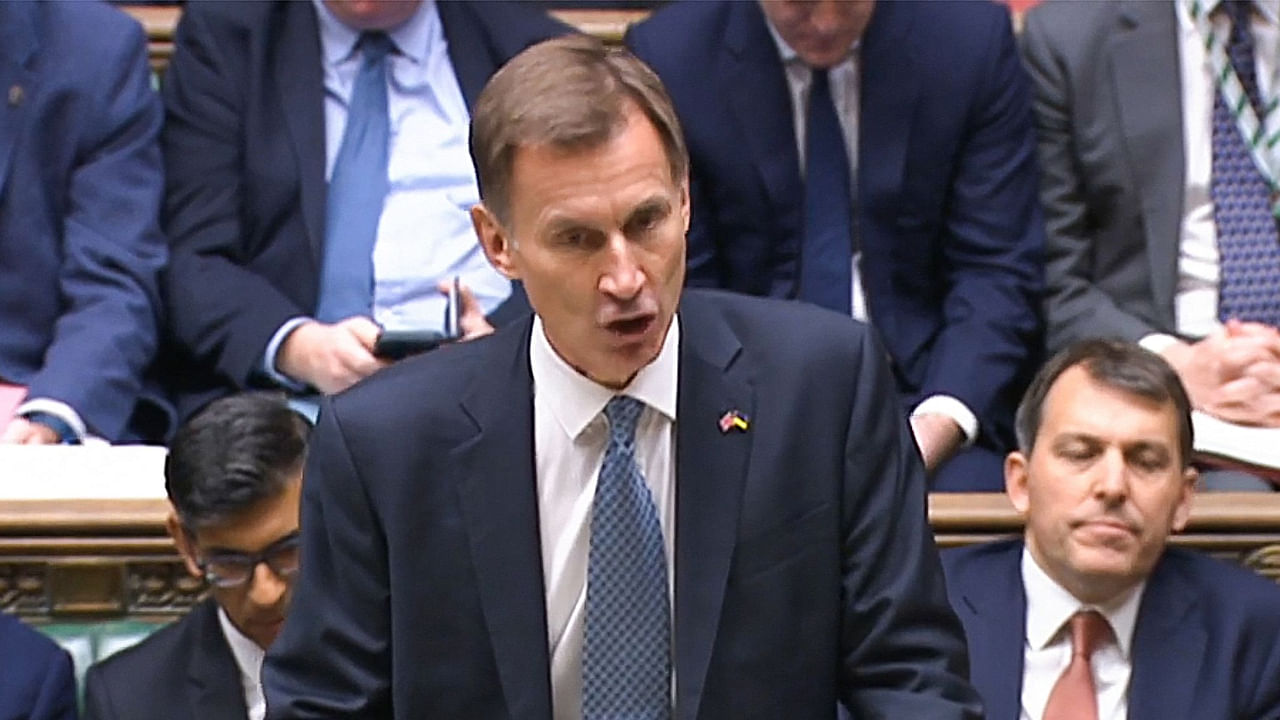
British finance minister Jeremy Hunt announced a string of tax increases and tighter public spending in a tough budget plan on Thursday that he said was needed after the blow dealt to the country's fiscal reputation by former prime minister Liz Truss.
Following is a snapshot of what he announced and reaction.
Growth and inflation
* Hunt said Britain's economy was forecast by the Office for Budget Responsibility to grow 4.2 per cent this year. It will then shrink by 1.4 per cent in 2023, compared with the OBR's March forecast of 1.8 per cent. The OBR sees growth of 1.3 per cent in 2024 and 2.6 per cent in 2025, Hunt said, compared with previous projections of 2.1 per cent and 1.8 per cent respectively.
* He said the OBR projected inflation of 9.1 per cent in 2022, a revision from its March forecast of 7.4 per cent, and of 7.4 per cent next year, up from a previously forecast 4.0 per cent.
Tax
* Hunt announced plans to freeze income tax allowances and lower the threshold at which people start to pay the highest rate of income tax.
* He said a windfall tax on oil and gas firms would be increased to 35 per cent from its current rate of 25 per cent, and extended to power generation firms at a rate of 45 per cent from January 1.
* Hunt said he would freeze income tax allowances until 2028 and was lowering the threshold above which the 45 per cent top rate of income tax is paid to 1,25,140 pounds ($148,053) from 1,50,000 pounds.
Public finances
* Britain will bring down its government debt as a percentage of economic output within five years under a new fiscal rule, Hunt said, not three years as previously.
He said the government would meet another fiscal rule that the budget deficit will be below 3 per cent of GDP within five years.
* Hunt said public spending would grow more slowly than the economy, but overall spending in public services would rise in real terms over the next five years.
Energy cap
* Hunt said the cost of an average household energy bill would rise to 3,000 pounds ($3,554.70) a year from April after he reined in his predecessor's vast support package for gas and electricity bills.
Minimum wage
* The national minimum wage will increase by 9.7 per cent to 10.42 pounds per hour from April, Hunt said.
Bank of England
* Hunt confirmed the Bank of England's inflation-fighting remit, adding that the government and Bank should work "in lockstep".
Politics
* "Our priorities are stability, growth, and public services," said Hunt. "We also protect the vulnerable because to be British is to be compassionate."
Markets
* UK government bond yields, which were already up prior to Hunt's statement, rose further, with the benchmark 10-year gilt yield last up 7 basis points at 3.21 per cent.
* "It's not fantastic news, but it's not as bad as the previous mini-budget that had unbudgeted spending followed by a bond sell-off in panic. This is careful financial conservatism, which is reassuring," said Giles Coghlan, chief market analyst at HYCM in London.
* Money market futures pointed to the Bank of England raising interest rates to a peak of 4.53 per cent by August next year, from 4.59 per cent immediately prior to Hunt's remarks.
* Sterling recovered from a brief dip against the dollar early in Hunt's speech and was last at $1.18395, down 0.6 per cent on the day.
* Britain's blue chip stock index was down 0.65 per cent at a session low as Hunt spoke.